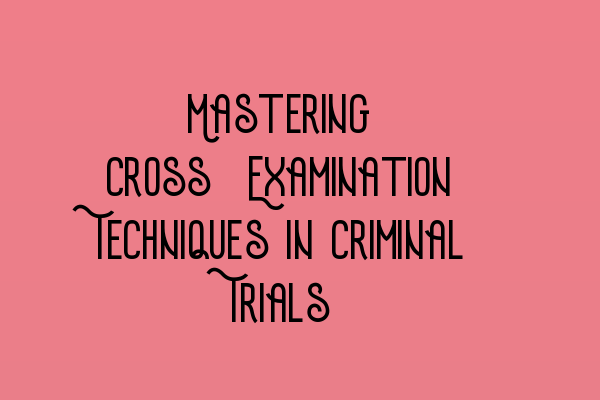Mastering Cross-Examination Techniques in Criminal Trials
Welcome to SQE Criminal Law & Practice Law UK. In this blog post, we will discuss the essential strategies and techniques for mastering cross-examination in criminal trials. Effective cross-examination plays a crucial role in presenting a strong case and uncovering the truth. Whether you are a solicitor, barrister, or aspiring criminal lawyer, these cross-examination techniques will help sharpen your skills in the courtroom.
1. Prepare Thoroughly
Thorough preparation is the foundation of successful cross-examination. Familiarize yourself with the case facts, witness statements, and any relevant evidence. Identify key issues to focus on during cross-examination, and formulate a strategic plan.
Take advantage of SQE 1 Preparation Courses such as SQE 1 Preparation Courses to enhance your legal knowledge and understanding.
2. Establish Credibility
Building rapport with the witness is essential for effective cross-examination. Establish trust and credibility by asking open-ended questions and actively listening to their responses. This will help in gaining the attention and cooperation of the witness.
3. Use Leading Questions
Leading questions are a powerful tool in cross-examination. Craft questions in a way that suggests the desired answers. This technique allows you to control the narrative and highlight inconsistencies or contradictions in the witness’s testimony.
4. Focus on Inconsistencies
Carefully analyze the witness’s statement for any inconsistencies or contradictions. Use these discrepancies to challenge the witness’s credibility and cast doubt on their testimony. Highlighting inconsistencies effectively can significantly weaken the opposing party’s case.
5. Control the Witness
During cross-examination, assert control over the witness by asking specific questions and avoiding open-ended ones. This approach limits the opportunity for the witness to provide lengthy explanations or digress from the main point.
6. Maintain Composure
Stay calm and composed throughout cross-examination, even in the face of challenging witnesses or unexpected responses. Maintaining a professional demeanor enhances your credibility and demonstrates your command of the courtroom.
7. Listen Carefully
Active listening is crucial during cross-examination. Pay close attention to the witness’s responses, body language, and tone of voice. This enables you to identify potential inconsistencies, contradictions, or omissions, which can be effectively probed further.
8. Adapt to the Witness
Each witness is different, and successful cross-examination requires adapting your approach accordingly. Some witnesses may respond well to aggressive questioning, while others may shut down. Tailor your techniques to the witness’s personality and adjust your strategy as necessary.
9. Use Visual Aids
Visual aids, such as diagrams, charts, or photographs, can be valuable in cross-examination. Use these aids to simplify complex information, clarify your points, and reinforce key arguments.
10. Practice, Practice, Practice
Like any skill, cross-examination improves with practice. Take advantage of SQE 1 Practice Exam Questions and SQE 1 Practice Mocks FLK1 FLK2 to enhance your cross-examination skills under exam-like conditions. This will not only increase your confidence but also refine your ability to think on your feet.
Mastering cross-examination techniques is essential for any criminal lawyer. Integrating these strategies into your practice will help you build a compelling case, effectively challenge witnesses, and ultimately achieve success in criminal trials. Remember to prepare thoroughly, establish credibility, focus on inconsistencies, control the witness, maintain composure, listen carefully, adapt to the witness, use visual aids, and practice diligently.
For more information and resources, visit SQE Criminal Law & Practice Law UK.
